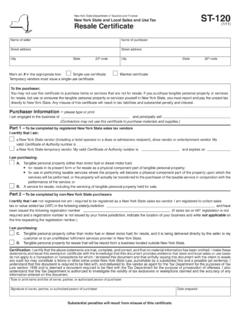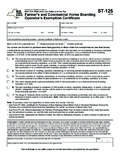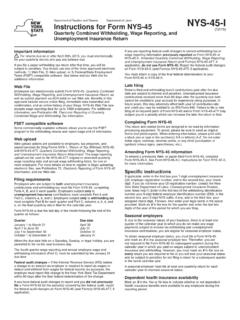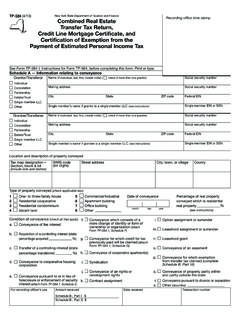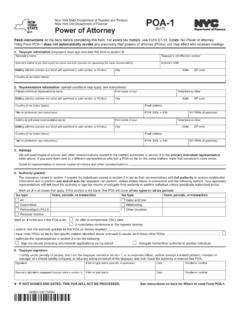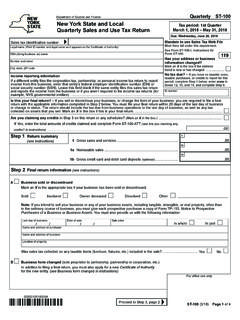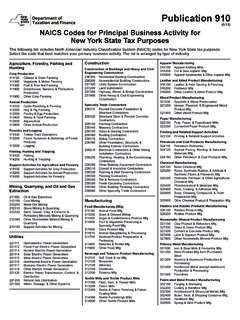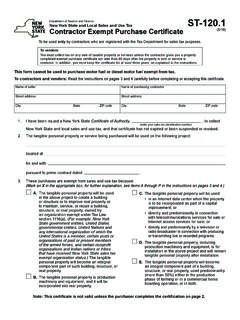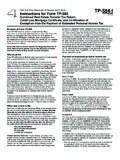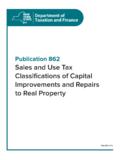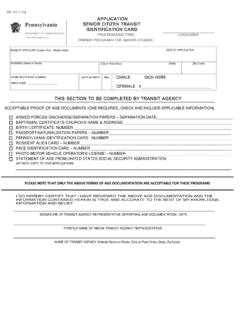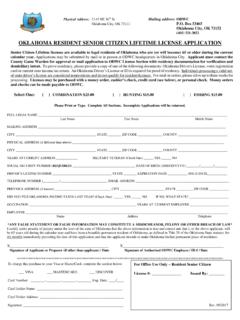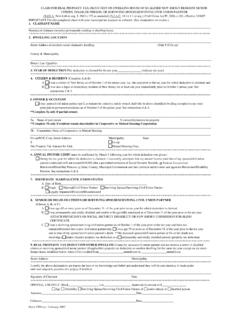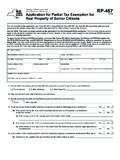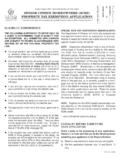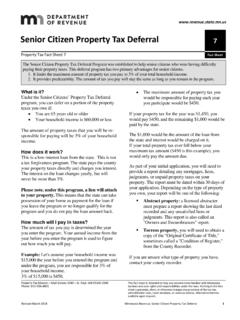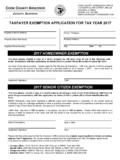Transcription of What is the Senior Citizens’ Exemption? How do I …
1 What is the Senior Citizens Exemption? The Senior Citizens Exemption is a benefit program that reduces your property taxes by 50%. If you re 65 or older and earn $29,000 or less, you may be eligible. Who offers the Senior Citizens Exemption? Any local government or school district can offer the exemption. This means your county, town, and school taxes could all be reduced by qualifying for this exemp-tion. To see if your localities or school district partici-pates, contact your local assessor, city or town clerk, or school district. Who is eligible? You must meet the following requirements to qualify: Age: You and all other owners must be 65 or older.
2 If you co-own the property with a spouse or sibling, only one of you needs to be 65 or older. Ownership: You must own the property for at least 12 con-secutive months prior to applying. Residency: You and all other owners must occupy and use the property as your primary residence. Income: You and all other owners must have combined income no greater than the maximum limit set by the local government or school district. The maximum limit can be as low as $3,000 or as high as $29,000. Some localities offer a reduced benefit if your income is greater than the maximum limit. How much will I save in tax dollars?
3 The Senior exemption works by reducing your prop-erty s taxable assessment by 50%. Your tax savings is thus 50% of your property s taxable assessment multi-plied by the applicable tax rate. Some local govern-ments offer a sliding scale option if your income exceeds the maximum limit. For example, a county may allow a 5% exemption for income as high as $37, How do I apply? File your application with your local assessor. Use Form RP-467 for your initial application and then use Form 467-Rnw to renew your application each year af-terwards. After five consecutive years of eligibility, you may not need to annually renew your application, if al-lowed by local option.
4 Instead, you may file an affidavit to your local government or school district. Use Form RP-467-aff/ctv for your local government and use Form RP-467-aff/s for your school district. Where can I get these forms? All forms are available on our Web site at You may also get these forms at the assessor s office. What is the deadline for applying? You must mail or hand-deliver your application to the assessor s office by the taxable status date. In most mu-nicipalities, this date is March 1, but it varies in some cities or counties. Some municipalities accept late appli-cations in certain hardship cases or for exemption re-newals.
5 How do I find the taxable status date? Visit The Web site also provides assessor telephone numbers and additional information for your municipality. We recommend you check the taxable status date on the Web site and then confirm it by contacting your assessor. Nassau County has an option to accept applications beyond its taxable status date of January 2. For New York City, the dead-line is March 15. How is age defined? The age requirement is 65 or older as of the taxable status date. Some localities extend the cut-off date to December 31 after the taxable status date. Contact your assessor to see if this applies.
6 Do I need to submit proof of age? Yes. For your initial application, you must send proof such as a birth certificate or baptismal certificate. If these are not available, an affidavit of age from the So-cial Security Administration, hospital birth record, mar-riage record, passport, military record, immigration documents or other reliable documents that show your age would be considered. How is ownership defined? You must have owned the property for 12 consecutive months prior to the date of filing. If you moved into a new home and received the Senior exemption for your previous residence, you don t need to meet the 12-month requirement.
7 The period of ownership will not be interrupted by: 1. A transfer of title to one spouse from the other. 2. A transfer of title to a surviving spouse from a deceased spouse either by will or operation of law. The period of ownership of a prior residence may be considered where 1. The property was sold by condemnation or other involuntary proceeding (except a tax sale) and another property has been acquired to re-place the taken property; or 2. The prior residence has been sold and a re-placement purchase made within one year if both residences are within the State. Do I need to submit proof of ownership?
8 Yes. Submit a certified copy of the deed, mortgage, or other instrument by which you became owner of the property. How is the exemption administered where property is in a trust? The exemption will be allowed if either all the trustees or all the beneficiaries otherwise qualify. That is, they meet the age, residency, and income requirements. How is the exemption administered where property is in a life estate? The exemption will be allowed if the life tenant other-wise qualifies. The life tenant is the person who owns and benefits from the property for the duration of his or her life. How is residency defined?
9 You and all other owners must occupy and use the prop-erty as your primary residence. You can only have one primary residence. What types of properties are eligible for the ex-emption? The exemption applies to any residential property used as a primary residence, including houses, condo-miniums, cooperative apartments, mobile homes, and farm houses. It also applies to mixed-use properties such as apartment buildings, but only for the portion owned and used as a primary residence. Do nursing home residents who own their homes satisfy the residency requirement? Yes, provided that no one other than a co-owner or spouse lives on the premises.
10 Does the residency requirement apply to a sepa-rated spouse? If you co-own the property with a spouse or former spouse who no longer resides in the home due to di-vorce, legal separation, or abandonment, only you need to satisfy the residency requirement. How does the exemption work for cooperative apartments and mobile homes in a mobile home park? File your application with your assessor. The assessor will provide a breakdown of the exemptions to the cooperative manager or park owner, who will then pass the tax savings onto you. How is income defined? The income requirement is based on the amount re-ceived in the previous calendar year.
